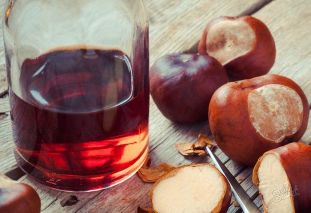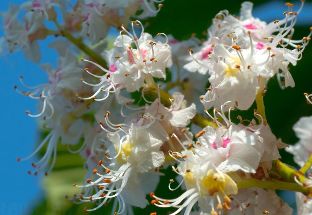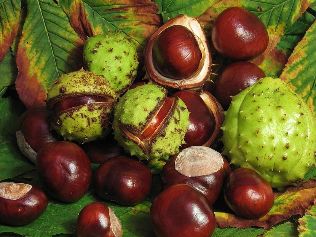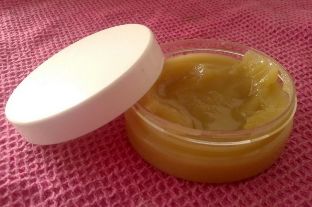Varicosity – the scourge of modern society. The disease affects more than 70% of the world's population and 20% of them are men. The reasons for such a large spread of the disease many. The reason is improper diet, obesity, wearing shoes with high heels, etc.
To cure varicose legs is quite real. And in this case we come to the aid of not only modern medicine, but traditional. She offers us many recipes of drugs that help strengthen the walls of blood vessels, normalize blood circulation and eliminate the external symptoms of the disease. But, as shown by many years of practice, the best in this area became the horse chestnut from the Varicosity.

The fruit and flowers of this tree are used to prepare therapeutic baths, tinctures, drinks, etc. and before you learn on how to cook these means the use of horse chestnut against varicose veins, I would like to tell you about how it works and what are the curative effect.
Horse chestnut veins: healing properties
Horse chestnut (flowers and cores) has a very rich chemical composition, due to which its use helps to strengthen the walls of small blood vessels, improving blood quality and its viscosity. In view of such properties of the infusions and decoctions of this tree are an excellent preventive treatment against varicose veins.
In the composition of the horse chestnut has a variety of flavonoids, tannins, vitamin e and saponin. These substances play an important role in the normalization of blood circulation, the destruction of atherosclerotic plaques and increase the tone of the small and medium blood vessels. These properties allow the use of chestnut veins in all stages of the development of the disease.
In addition, horse chestnut contains other useful substances, which have a strengthening effect on the entire body. These include rutin, coumarin, astragalin, lutein and sterol.
Especially popular in treating varicose veins horse chestnut is the result of the presence of esculin and escin. The first promotes the acceleration of blood flow through the vessels, accelerated synthesis of antithrombin, prevents blood clots and has anti-edema effect. The second substance (escin) improves the tone of blood vessels and thins the blood, which also prevents the formation of cholesteric and atherosclerotic plaques on the inner walls of the blood vessels.
All of these activities on the horse chestnut on the blood system and enable the successful fight against the venous dilatation. According to some sources, the first results following its use are already noticeable in 2-3 weeks.
So, what do we get, when you perform in the treatment of varicose veins equus castaneis? Here's what:
- in the legs appears to ease;
- cease to disturb the swelling of the lower limbs;
- disappears;
- the veins become strong, to become a normal size and become less noticeable;
- improves overall health normalizes sleep, work gastrointestinal tract, increases the resistance to stress, etc.).

How to collect chestnut for treatment of varicose veins of the legs?
Before you start with the treatment of varicose veins, you need to correctly prepare raw materials for the preparation of home remedies. As you will be properly prepared horse chestnut, depends a great part of the success of the treatment.
The leaves and flowers of horse chestnut, to collect in the spring. They need to be rinsed under water and dry. But the core of the chestnut should be collected only when they are of a large round shape and are just starting to ripen. The ripe kernel of the chestnut used for the treatment of varicose veins is not necessary, as it would be very helpful. The longer maturing chestnut, the reduction of the useful medicinal substances.
It should be noted that for the preparation of medicinal drugs used not only the leaves, flowers, and the kernel of the chestnut, but its seeds and bark. To prepare tinctures are often used the core of the chestnut. Some prescriptions require prior purification of the skin. To remove it is quite simple and it can be done either by hand (if the peel is open), or with a knife.
As for drying raw materials, drying it need the room, not in the sun. And this should be done for a month, constantly stirring the raw materials. To ensure good air flow. If this is not done, your work can become covered with mold, and then use it for the treatment of varicose veins.
Contraindications for the use of horse chestnut
Before you begin recipes horse chestnut varicose veins, it is necessary to note contraindications to its use. But, it can not be applied neither in nor outside with the following diseases and conditions:
- pregnancy and lactation;
- violation of blood coagulability;
- acute inflammatory diseases of the gastrointestinal tract;
- kidney failure;
- low blood pressure (hypotension).
With all these diseases and conditions of the use of tinctures, ointments and other remedies, on the basis of horse chestnut can greatly harm your health.

Horse chestnut veins: recipes
The treatment of varicose veins chestnut includes the use of various tinctures, ointments, and baths. I would like to start with tinctures horse chestnut, as it is the most popular and effective in the fight against the disease.
To prepare a tincture of horse chestnut, you need to take for 50 g of kernels, not peeled, place them in a glass jar and pour a glass of rubbing alcohol. Bank be sure that you tightly close lid, wrap in a dense impermeable fabric and put the two weeks in dark place.
After the infusion of a good rises, it needs to drain and the refrigerator. To make such a tool is necessary for 3 weeks 10-15 drops 2-3 times a day. Then make one week break and the course of treatment with the use of the drug can be repeated.
The therapeutic use of the medicinal product can also be prepared from the flowers of horse chestnut. To do this you will need to fill a bottle of dark glass a small number of flowers (2-3 tablespoons) and pour 0.5 liters of rubbing alcohol. Only push this tincture should not 2 weeks and one month. It is necessary to take 50 drops 3 times a day.
When the veins are very useful drain the juice from the flowers of horse chestnut. It is the internal half of the tsp immediately after a meal or lubricate the affected areas veins.
At home you can also prepare a healing salve from horse chestnut. To do this in a blender grind 5 kernels and 5 tablespoons of flowers of chestnut. Then, the resulting mixture should be composted in the container, pour 0.5 liters of any vegetable oil and put over boiling water. Boils so you need to be at least 2 hours.
Then, the mixture, strain, cool to room temperature, pour into a clean container and refrigerate. To use the ointment two ways: only for lubrication a few times a day, the affected vein or making a compress on the night. To do this, apply the ointment in a thick layer on your feet, wrap them in several layers of polyethylene and a warm scarf.
The ointment can also be prepared from the flowers of the chestnut. To do this, the raw material, mixed with vegetable oil (1:1) and left to stand about 4-6 hours. Then the mixture should be placed above the boiling water, boil several hours, strain and cool. To use such an ointment can be the same as the previous case.
It should be noted that these fats can be used for cooking and medicinal baths. To do this, take 40 grams of ready-made medicines, and it is cultivated in 2 liters of hot water. The resulting solution should reduce the feet for 10-15 minutes and then wrap them with a towel and lie down to rest for a few hours. After the bath almost immediately go swelling, pain and heaviness in the legs.
If your home is the green bark of the horse chestnut, then you can use it to treat varicose veins. To do this, take a handful of peels, fill it with one liter of water, cook for about 10 minutes, let stand overnight, then strain and take 1 tbsp before bedtime for a few weeks.

Home remedies with equus castaneis veins effective only if used regularly. In this case they necessarily need to be in combination with medication prescribed by a doctor.




































